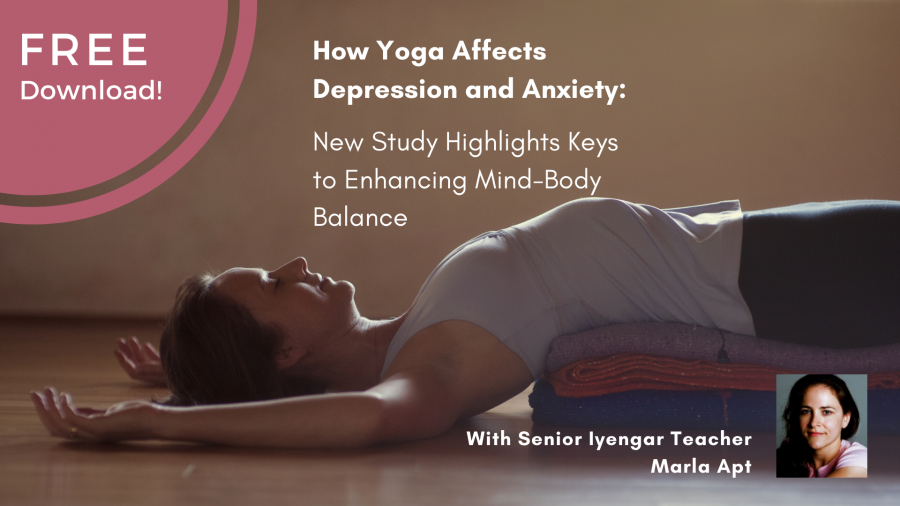Free Download! How Yoga Affects Depression and Anxiety: New Study Highlights Keys to Enhancing Mind-Body Balance
Course Info
- Price:
- $0.00
Marla Apt
 Marla is a Senior level Certified Iyengar Yoga teacher with over 25 years of experience teaching throughout the United States and abroad.
Since visiting India for the first time to conduct research for a degree in Buddhist Philosophy, Marla has returned annually to study yoga under the direction...
Marla is a Senior level Certified Iyengar Yoga teacher with over 25 years of experience teaching throughout the United States and abroad.
Since visiting India for the first time to conduct research for a degree in Buddhist Philosophy, Marla has returned annually to study yoga under the direction... 
If you practice yoga regularly, you’ve probably noticed that one of the many wonderful benefits of yoga includes its ability to enhance mood and balance mind and emotions.
But have you ever wondered how this happens? In this free download talk, Iyengar yoga teacher Marla Apt discusses the many benefits of yoga for mind-body balance and shares the result of a recent study she helped develop on the benefits of yoga for depression.
“We know that mood, mental states, and emotional states are in our body, in our nervous system. It is in this intersection between the nervous system and the mind where yoga is starting to impact us,” Marla says.
Marla contributed to the design of a recent study that used yoga-based interventions to relieve the symptoms of depression, generalized anxiety disorder, and IBS at UCLA. She also created the first yoga therapy content to be integrated into the David Geffen curriculum for the David Geffen School of Medicine at UCLA.
“We can now track the impact yoga can have on our mood by actually changing the neurotransmitters, chemical structure, and hormonal structure of our brains,” Marla relates.
Marla explains that ongoing neuroscientific research is underway to develop a better understanding of how conditions such as depression, anxiety, and mood disorders affect our entire nervous system. This information will contribute more to our understanding of how yoga can help improve mood. And as more funding for research becomes available the specific mechanisms of how yoga impacts the body and the brain can be studied.
For the UCLA study, Marla relied on guidance from her teacher, BKS Iyengar, to devise a repeatable asana sequence that drew on his own work with therapeutic yoga.
“For a practitioner who's experiencing something like depression, a lack of embodiment, or not feeling present in the body, using asana can actually bring about a sense of self-awareness from the level of the body outward. We expand our sense of self from the innermost core to the outer periphery to the outer world. That's one of the ways that yoga helps us,” Marla states.
“One of the things that I love about Iyengar yoga is I think it has a kind of scientific approach in the sense that it's really about examining how we approach a given posture? For example, if we do an asana giving attention to a particular aspect of the asana, we can ask ourselves what effect that has. We watch. We observe,” says Marla.
The benefits gained by pairing action–asana–with self-reflection, called Svadhyaya in yoga, exists in all forms of yoga, not just Iyengar, Marla explains. And as modern scientific study proceeds apace, we can continue to heed the wisdom of the ancients regarding the relationship of body, mind and breath for ourselves with every trip to the mat.
“Through slowing down and observing, we can actually pinpoint what each particular technique is about and use those tools for targeted conditions for a targeted approach,” Marla shares.
“There’s tapas, where you put in some effort, and then there's this reflection where you get to see, ‘Oh, that's the imprint of this pose. When I open my chest, I feel a more positive mind state’ and then, ‘Oh, this practice had an effect on my diaphragm - the inhalation became smoother’ and then, ‘If I do Setu Bandha Sarvangasana my abdominal region is softly lengthened. I can feel that there's a calming of my nerves as a result.